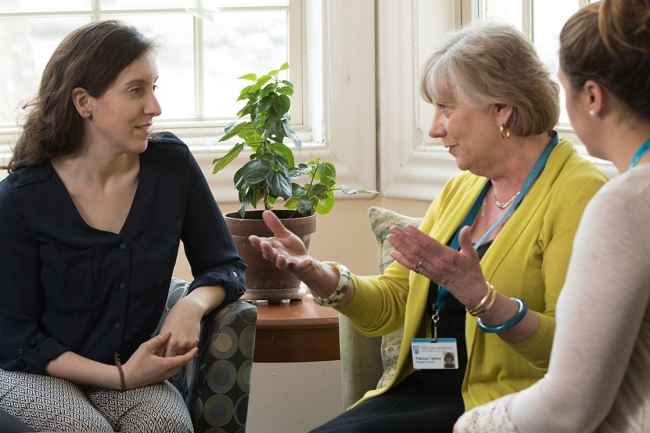Klarman Eating Disorders Center
Helping young adults with anorexia, bulimia, and binge eating disorder. Call us today to talk to our admission staff about treatment options.
Founded with the generous support of the Klarman Family Foundation, the Klarman Eating Disorders Center (KEDC) provides world-class treatment for young adults, including cisgender women, transgender women, and non-binary individuals, ages 18 to 28.
Our residential and partial hospital program specializes in the treatment of anorexia, bulimia, binge eating disorder, and avoidant/restrictive food intake disorder (ARFID).
For more information on our insurance-based program, or to make a referral, please call 617.855.3410.
The Klarman Eating Disorders Center is ideal for young people who:
- Have been diagnosed with anorexia, bulimia, binge eating disorder, or ARFID
- Are in need of 24-hour care in order to begin the path towards recovery
- Seek treatment for coexisting mental health conditions such as depression, anxiety, and addiction
The KEDC draws from all of the resources at McLean Hospital to comprehensively treat each patient individually for the best possible outcome.
Recognizing that each patient has a distinct set of issues that contribute to their eating disorder, we also understand that many also struggle with co-occurring mental health problems such as substance misuse, depression, mood and anxiety disorders, as well as trauma and post-traumatic stress disorder.

The Klarman Eating Disorders Center is a leader in mental health care for individuals with anorexia, bulimia, binge eating, and avoidant/restrictive food intake disorders
The overarching goals of treatment are to improve symptom control, foster a sense of understanding of the patient’s emotional life and the issues underlying the eating disorder, enhance self-esteem, and build a greater sense of personal and family well-being. Our average length of stay varies based on the needs of the individual.
Learn more about eating disorders treatment at McLean.
“Klarman was outstanding in every way, extremely caring and professional. Thank you all, you saved my life.”– Klarman Eating Disorders Center patient
Treatment Approach
Our individualized treatment plans are developed for patients at each level of care and are based on a therapeutic contract. The contracts are created with the patient, in their own words, focusing on treatment and life goals and are collaboratively shared with family and the program’s staff.
This approach is effective toward meeting the challenges of life after being discharged. Treatment plans are continually monitored, discussed, and renegotiated as progress is made.
Our patients are taught the skills to manage their physical and mental health and to change problematic behaviors by increasing their self-awareness. They develop healthy relationships with food and their bodies, paving the way to recovery.

Staff at Klarman are dedicated to delivering world-class eating disorders care
Our comprehensive treatment includes:
- Medical, psychiatric, psychological, and nutritional evaluation
- Monitoring of labs, vital signs, bathroom use, weight, and physical health
- Nutrition education and counseling by a registered dietician
- Individual psychotherapy (three times per week)
- Family therapy (one to two times per week)
- Daily milieu and group therapy
- Expressive arts therapy
- Psychiatric consultation and medication management and evaluation
- Impulse control and anger management training
- Social and interpersonal relationship skill building
- Menu and meal planning, cooking, and kitchen preparation
- Self-esteem and body image development
- Evidence-based treatment including cognitive behavioral therapy (CBT), dialectical behavior therapy (DBT), acceptance and commitment therapy (ACT), and psychodynamic therapy
- Academic assistance with tutoring for high school students and separate assessments for transition to college/return to college
- Specialized consultations for trauma and substance use
- Transition and discharge planning including relapse prevention
- Restaurant outings
- Animal-assisted interventions, such as equine-assisted therapy group program
- Yoga
We believe that family involvement is crucial to understanding the impact of the illness on a patient’s and family’s life and is essential to supporting healthy recovery. We engage parents, siblings, and loved ones in therapy, education and close communication to help realize this common goal.
In addition to the residential component of the KEDC, we also offer partial hospital services. After completion of the residential program, the patient continues treatment during the day and through a supervised evening meal. Patients are then able to practice their newly acquired coping skills at home in the evening.
The emphasis is on providing a smooth transition to home by learning and practicing the necessary skills that help reduce the potential for relapse and provide a sufficient level of stability for the patient to succeed in outpatient treatment.
Admission & Cost
Admission
For further information about our program or to make a referral, please contact our admissions coordinator:
Phone: 617.855.3410
Email: @email
Cost
McLean Hospital accepts many insurance plans, including Medicare and Massachusetts Medicaid.
More information on insurance providers accepted by McLean Hospital may be found on the Mass General Brigham website. You may also find it beneficial to review McLean’s patient billing and financial assistance information.
Treatment Team
Program Leadership

David J. Alperovitz, PsyD, Program Director
Dr. Alperovitz has been a member of the clinical staff of McLean for over 25 years, caring for a broad cross section of ages in various programs. He has extensive clinical experience working with individuals, couples, and families providing assessment and psychotherapy for people with eating disorders, depression, anxiety disorders, PTSD, dissociative disorders, and obsessive compulsive disorder. Dr. Alperovitz is an assistant professor of psychology in the Department of Psychiatry at Harvard Medical School.

Esther Dechant, MD, Medical Director
Board certified by the American Board of Psychiatry and Neurology in psychiatry with subspecialty certification in child and adolescent psychiatry, Dr. Dechant is experienced in child, adolescent, and adult medication evaluation and management and psychotherapy. She holds an appointment as an assistant professor in psychiatry at Harvard Medical School.

Holly S. Peek, MD, MPH, Assistant Medical Director
Dr. Peek is an instructor in psychiatry at Harvard Medical School and is board certified in both adult and child and adolescent psychiatry by the American Board of Psychiatry and Neurology. She also has a private practice where she specializes in child, adolescent, and adult psychotherapy and medication evaluation and management.
Staff and Associates
Treatment plan success largely depends on the robust and active collaboration between patients and their families. Our staff includes a multidisciplinary group of board-certified psychiatrists, licensed clinical social workers, psychologists, registered nurses, dietitians, and expressive therapists.
This highly trained and experienced team provides rapid, accurate diagnosis, thorough treatment planning, aftercare planning, and high-quality care tailored to each individual’s needs.
Accommodations
Located in the Bowditch Building, one of several historic buildings on McLean’s Belmont campus, the Klarman Eating Disorders Center is a home-like setting that offers privacy and adequate supervision as well as a strong sense of community.

Klarman is located on McLean’s Belmont campus
Though McLean Hospital is located only minutes from Boston, its setting offers a pleasant, peaceful environment that enables patients to focus on improving their mental health. The program facilities offer comfortable bedrooms and common areas for groups and conversation.
Frequently Asked Questions
Where is the Klarman Eating Disorders Center located?
The program is located on the Belmont campus, in the Bowditch Building. For more information on directions, parking, and local accommodations, please visit our Maps & Directions page.
Who benefits most from the program?
Our residential program focuses on treating young adults, cisgender women, transgender women, and non-binary individuals, ages 18 to 28 who struggle with a primary eating disorder diagnosis of anorexia nervosa, bulimia nervosa, avoidant/restrictive food intake disorder (ARFID), and binge eating disorder, in addition to co-occurring psychiatric diagnoses of major depression and bipolar disorder, PTSD, anxiety disorders, obsessive compulsive disorder, and substance use disorders.
Individuals older than 26 may be considered for admission on an individual basis.
Is family involved in treatment?
As the whole family is impacted when a family member has an eating disorder, family involvement and family therapy is a mandatory component of our treatment program.
Is smoking permitted?
Our program is non-smoking.
When are visiting hours?
Visitors are permitted, following program policies. Visiting hours are 2-8pm, seven days a week.
Please speak to the patient’s treatment team for more information. Additional details can be found on the Visitors page.
Are cell phones and other electronics allowed?
Patients may use their personal cell phones and laptops.
Are academics offered?
While our first priority is treatment, we recognize the importance of education. Our Intake Coordinator works closely with parents and the family therapist to coordinate schoolwork with the student’s guidance counselor or school representative, and can assist with obtaining tutors as necessary.
Academic time is included in the daily program schedule and we have an academic room with computers designated for completion of homework. Free time and visiting hours are generally used as additional opportunities to focus on schoolwork.
Is aftercare planning a part of the program?
The treatment team works closely with the individual as well as with family, significant friends, and outside providers to develop a personalized aftercare plan. Recommendations by staff are made based upon clinical needs, progress made during treatment, and long-term treatment goals.
Can former patients access their medical records?
All requests for medical records should be directed to McLean’s Health Information Management Department.
Are support groups offered?
To complement our programs’ services and encourage individuals’ initiatives in their own treatment course, many self-help groups are hosted by McLean.
Does McLean gather patient feedback?
McLean is dedicated to maintaining high-quality and effective patient care. To ensure that those standards remain at the highest level, we utilize a number of feedback instruments and quality indicators.
Among these tools are the Perceptions of Care survey which monitors patient satisfaction and BASIS-24™, a psychiatric outcomes measurement tool created at McLean and widely used in the U.S. and around the world, which delivers feedback on the patient care experience.





